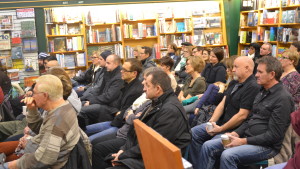What makes romance interesting? If you don’t read romance novels (like me), then you might answer, “Nothing.” But such a pat answer would be a little disingenuous. Personal preference aside, romance is the best-selling fiction genre by far. By far. If you don’t believe me, then just take a quick jaunt over here. Seventy-five million people read at least one romance novel in 2008 and the genre generated nearly three billion dollars in sales in the last two years. Yikes. Anyway, who am I to argue with seventy-five million fellow readers? That’s a fight I can’t win.
You could argue that it’s almost impossible to write a compelling narrative with no trace of romance in it. Even if it were possible, though, you’d be missing out on a massive storehouse of dramatic potential. Interpersonal relationships drive stories, and that’s a fact; romantic interpersonal relationships, by virtue of being the most complicated and emotional type of relationship, drive the most complicated and emotional stories. I know those are some broad statements, but they’re generally true.
So again I’ll ask, what makes romance interesting? What makes it compelling? “The love,” you might say, reductively. That would be true. Kind of. The conflict—the fireworks—doesn’t come from love, per se, as feelings of love are symptomatic of the true root cause of all this interest: intimacy. People really get off on intimacy.
Now, bear in mind that love and intimacy aren’t quite the same thing, though they are certainly close cousins. Love comes from intimacy, as I just alluded to, and the two aren’t mutually exclusive. Which is why, to cite a popular example, you can have sex (highly intimate) without love. This is largely the difference, I suppose, between romance and a lot of erotica.
Intimacy is about closeness. When I fall in love with another person, I let them into my life, sharing aspects of myself with them; they, in turn, share aspects of themselves with me. Our lives merge, at first slowly, and then in more significant ways as the relationship develops. Two—or more, if you swing that way—become one. By absolutely zero coincidence, sex is a wonderful metaphor for this process, which is why it’s intimate.
If closeness generates intimacy, then outright control does the same. Instead of merging your life with another person, you allow another person to take over your life. To control you, to take over your decision-making process. That’s as intimate as it gets. Well-meaning fetishists engage in bondage play all the time, and hopefully they do it temporarily and with some imposed structures. Beyond that, intimacy can go to some really dark places. A lot of crimes revolve around the perverted need for intimate control—rape and kidnapping, to name two—and then finally, the most extreme intimacy of all: murder.
My curiosity was piqued last year, in the darkest and most horrible way, when I stumbled upon some disturbing research while working on a book. As a matter of course, I don’t know that much about various fetishes (and fear not, I’m not going to commit much ink to this), but did you know there is a fetish in which a person can deeply desire another person to murder them, for sexual fulfillment? I even heard of a case from Europe where a person contracted another person to murder them and then cannibalize them; if sex, as a means of physically merging oneself with another, is a metaphor for romantic intimacy, then surely cannibalism is the most extreme metaphor for the intimacy of control.
And thus horror and romance are inextricably linked. Perhaps I’m just naïve, but I’d never heard of any of this before, and frankly I wish I never had.
So yes, people crave intimacy. It’s no longer looking so strange that the romance genre sells so many books. I mean, people are looking for the fulfillment of deep drives and desires which are sometimes hard to fulfill in the real world. Romance in stories—whether in a full-blown romance novel or in the majority of stories which merely contain a romantic element—helps frustrated readers of all stripes come to terms with the state of their own mundane lives.
Horror works the same way, by giving cathartic rise to the dark places inside us all and letting us (or perhaps forcing us to) confront them. Murder specifically—and death in general—is powerful precisely because it touches us in horrifyingly intimate ways. It’s no shock that the best works of fiction combine all these emotions and feelings to get a rise out of us—and understanding these connections can make us all better writers and observers of the human condition.


 On the evening of November 7, a small group of readers gathered at my parents’ home to hear the first reading from my new book, The City of Darkness. This was the pre-launch, and it was reserved not for close friends but rather the people who had responded the strongest to the first novel in my ongoing series, which had been released two years earlier. (An unconscionably long gab between books, by the way, but that’s a subject for a different post.)
On the evening of November 7, a small group of readers gathered at my parents’ home to hear the first reading from my new book, The City of Darkness. This was the pre-launch, and it was reserved not for close friends but rather the people who had responded the strongest to the first novel in my ongoing series, which had been released two years earlier. (An unconscionably long gab between books, by the way, but that’s a subject for a different post.)